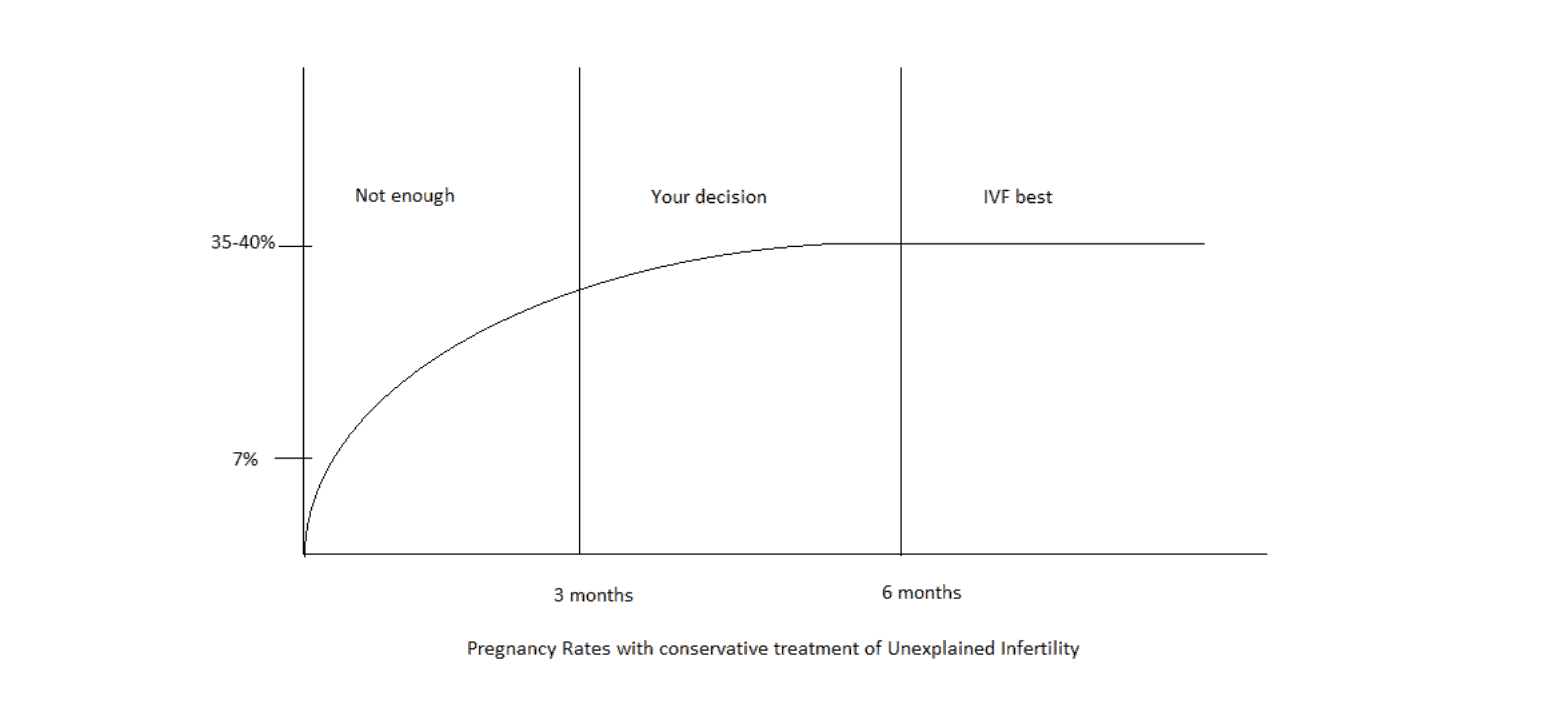Almost every couple who is struggling to conceive wants to know why. Is there something wrong with me? With my partner? Are we not doing something right? Is it something I am eating, not eating, doing, or not doing which is getting in the way? And will we ever get pregnant?
Treating unexplained infertility
At our fertility center, we use the best evidence to guide couples through the treatment of unexplained infertility.
What works?
- Certain lifestyle changes. Quitting smoking (for men and women) and working towards a healthy body weight (with healthy nutritional choices and modest exercise) can make a meaningful difference in both getting pregnant on your own and with assistance.
- Clomid (or letrozole) + IUI. This approach uses a simple five-day course of oral medications each month. The medication, clomiphene citrate (or an alternative agent called letrozole), boosts a woman’s egg release (ovulation), often resulting in two eggs being released per month instead of one. We generally will recommend an ultrasound to watch your body’s response to the medication and a single ovulation trigger injection to time the next step, IUI (or artificial insemination), just right. The IUI process is a simple vaginal procedure used mid-cycle to increase the number of strong-swimming sperm in the uterus.
- IVF. This approach is more aggressive and involves injection-based medications taken daily for 10 days or so. This leads to more frequent ultrasounds, blood tests, and ends with a minor procedure under sedation/anesthesia to retrieve the eggs away from the “unexplained” environment.
What doesn’t help?
- Clomid alone. Although still prescribed by some doctors as the first-line treatment, multiple research studies have shown that this doesn’t actually improve your chances significantly at all.
- IUI alone. This might feel like a nice place to start for a couple who prefers to avoid medicine, but once again, research studies have shown that IUI alone may not be that beneficial for unexplained infertility.
- Explorative laparoscopic surgery. In the past, this was used to try to identify and fix silent endometriosis which can be a reason for unexplained infertility. Unfortunately, after most laparoscopies, the diagnosis is still unexplained and when scar tissue is found and treated, the prognosis is still disappointing. We advise to avoid laparoscopies in the context of unexplained infertility.
What are our chances?
Thankfully, as mentioned above, you have an excellent chance to eventually have a baby if you are pursuing treatment for unexplained infertility. It is important to recognize, however, that it doesn’t always happen right away. The helpful lifestyle changes mentioned above take time to yield benefits and are rarely the sole reason for eventual success. The monthly chance for success with each medical treatment varies from couple to couple, but in general, the success rate for clomid+IUI is around 9% per month, while the success rate with IVF can be as high as 60% per month for some patients.
Given the higher success with IVF, why doesn’t everyone just do that? As mentioned above, it is a more involved process, and with that comes a greater expense. It is generally more cost-effective to do clomid+IUI several times than to jump into IVF right away. However, it is important to note that clomid+IUI becomes less effective over time, with reduced chances of per-cycle success after 3 failed months, and minimal chance of success after 6 failed months. For this reason, we advise that you might consider trying IVF instead if you have already had 3 unsuccessful cycles of clomid+IUI and that you should consider IVF if you have failed to get pregnant with 6 attempts of clomid+IUI.


Some couples choose to begin treatment with IVF instead of starting with clomid+IUI for the following reasons:
- Age of the parents-to-be
- High priority on time efficiency
- Greater aversion to twin pregnancy (which is more common with clomid+IUI)
- Desire for genetic or chromosomal testing of embryos
- Woman’s egg’s reserve
- Desire to freeze embryos or eggs for future pregnancies
At CRE, we are so proud to have been a part of so many unexplained infertility success stories. We hope to have the chance to be a part of yours! Please call us at 972-566-6686 or click here to make an appointment to meet with Dr. Collins or Dr. Saleh for consultation.









